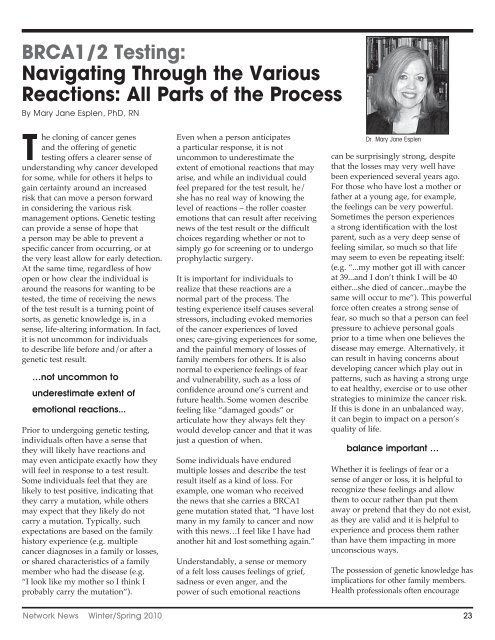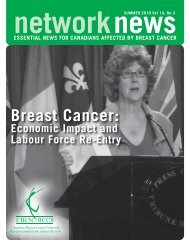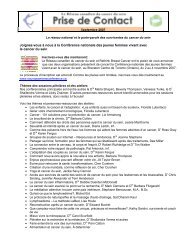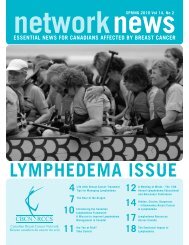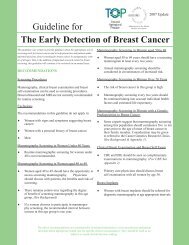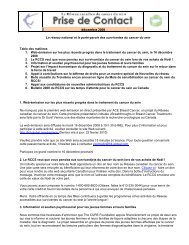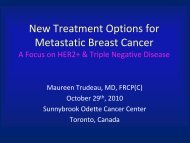Network News - Winter/Spring 2010 - Canadian Breast Cancer ...
Network News - Winter/Spring 2010 - Canadian Breast Cancer ...
Network News - Winter/Spring 2010 - Canadian Breast Cancer ...
You also want an ePaper? Increase the reach of your titles
YUMPU automatically turns print PDFs into web optimized ePapers that Google loves.
BRCA1/2 Testing:<br />
Navigating Through the Various<br />
Reactions: All Parts of the Process<br />
By Mary Jane Esplen, PhD, RN<br />
The cloning of cancer genes<br />
and the offering of genetic<br />
testing offers a clearer sense of<br />
understanding why cancer developed<br />
for some, while for others it helps to<br />
gain certainty around an increased<br />
risk that can move a person forward<br />
in considering the various risk<br />
management options. Genetic testing<br />
can provide a sense of hope that<br />
a person may be able to prevent a<br />
specific cancer from occurring, or at<br />
the very least allow for early detection.<br />
At the same time, regardless of how<br />
open or how clear the individual is<br />
around the reasons for wanting to be<br />
tested, the time of receiving the news<br />
of the test result is a turning point of<br />
sorts, as genetic knowledge is, in a<br />
sense, life-altering information. In fact,<br />
it is not uncommon for individuals<br />
to describe life before and/or after a<br />
genetic test result.<br />
…not uncommon to<br />
underestimate extent of<br />
emotional reactions...<br />
Prior to undergoing genetic testing,<br />
individuals often have a sense that<br />
they will likely have reactions and<br />
may even anticipate exactly how they<br />
will feel in response to a test result.<br />
Some individuals feel that they are<br />
likely to test positive, indicating that<br />
they carry a mutation, while others<br />
may expect that they likely do not<br />
carry a mutation. Typically, such<br />
expectations are based on the family<br />
history experience (e.g. multiple<br />
cancer diagnoses in a family or losses,<br />
or shared characteristics of a family<br />
member who had the disease (e.g.<br />
“I look like my mother so I think I<br />
probably carry the mutation”).<br />
Even when a person anticipates<br />
a particular response, it is not<br />
uncommon to underestimate the<br />
extent of emotional reactions that may<br />
arise, and while an individual could<br />
feel prepared for the test result, he/<br />
she has no real way of knowing the<br />
level of reactions – the roller coaster<br />
emotions that can result after receiving<br />
news of the test result or the difficult<br />
choices regarding whether or not to<br />
simply go for screening or to undergo<br />
prophylactic surgery.<br />
It is important for individuals to<br />
realize that these reactions are a<br />
normal part of the process. The<br />
testing experience itself causes several<br />
stressors, including evoked memories<br />
of the cancer experiences of loved<br />
ones; care-giving experiences for some,<br />
and the painful memory of losses of<br />
family members for others. It is also<br />
normal to experience feelings of fear<br />
and vulnerability, such as a loss of<br />
confidence around one’s current and<br />
future health. Some women describe<br />
feeling like “damaged goods” or<br />
articulate how they always felt they<br />
would develop cancer and that it was<br />
just a question of when.<br />
Some individuals have endured<br />
multiple losses and describe the test<br />
result itself as a kind of loss. For<br />
example, one woman who received<br />
the news that she carries a BRCA1<br />
gene mutation stated that, “I have lost<br />
many in my family to cancer and now<br />
with this news…I feel like I have had<br />
another hit and lost something again.”<br />
Understandably, a sense or memory<br />
of a felt loss causes feelings of grief,<br />
sadness or even anger, and the<br />
power of such emotional reactions<br />
Dr. Mary Jane Esplen<br />
can be surprisingly strong, despite<br />
that the losses may very well have<br />
been experienced several years ago.<br />
For those who have lost a mother or<br />
father at a young age, for example,<br />
the feelings can be very powerful.<br />
Sometimes the person experiences<br />
a strong identification with the lost<br />
parent, such as a very deep sense of<br />
feeling similar, so much so that life<br />
may seem to even be repeating itself:<br />
(e.g. “...my mother got ill with cancer<br />
at 39...and I don’t think I will be 40<br />
either...she died of cancer...maybe the<br />
same will occur to me”). This powerful<br />
force often creates a strong sense of<br />
fear, so much so that a person can feel<br />
pressure to achieve personal goals<br />
prior to a time when one believes the<br />
disease may emerge. Alternatively, it<br />
can result in having concerns about<br />
developing cancer which play out in<br />
patterns, such as having a strong urge<br />
to eat healthy, exercise or to use other<br />
strategies to minimize the cancer risk.<br />
If this is done in an unbalanced way,<br />
it can begin to impact on a person’s<br />
quality of life.<br />
balance important …<br />
Whether it is feelings of fear or a<br />
sense of anger or loss, it is helpful to<br />
recognize these feelings and allow<br />
them to occur rather than put them<br />
away or pretend that they do not exist,<br />
as they are valid and it is helpful to<br />
experience and process them rather<br />
than have them impacting in more<br />
unconscious ways.<br />
The possession of genetic knowledge has<br />
implications for other family members.<br />
Health professionals often encourage<br />
<strong>Network</strong> <strong>News</strong> <strong>Winter</strong>/<strong>Spring</strong> <strong>2010</strong> 23


